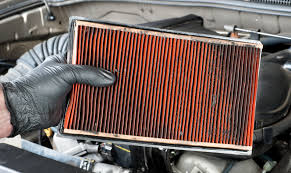The engine requires thousands of gallons of clean air to burn just one gallon of fuel and with this kind of air volumes entering the engine, you can imagine the amount of dirt that can be deposited on your engine as a result of a dirty filter. Clean air guarantees you better operation of the vehicle, lower gas mileage, improved acceleration, lower emissions and in overall it increases your engine life. This is more the reason why as a car owner, you should strictly adhere to the manufacturer’s car information and maintenance recommendation.
Our first recommendation is to make a habit of doing a car evaluation when driving. If you notice a decrease in your gas mileage or ignition problems, this could be an indicator that your air filter needs replacement. A dirty filter blocks does not allow sufficient air to the engine which affects the emission control systems and can shot the spark plugs due to a heavy air-fuel mixture. Healthy spark plugs ensure a smooth start of the engine.
A visual inspection of your air filter against bright light will tell you whether your filter is in good condition or not. A new filter is usually white or slightly off white but if you notice darkened colour and residue debris clogging it, it means it is time to replace. Mostly, replacements are recommended for every 12,000 and 15,000 kilo meters if you are hoping to get good results later on when assessing car value of your ride.
For a ‘do-it-yourself’ car owner, changing an air filter is easy and will not break your pocket. In most new cars, the filter is housed in a plastic rectangular casing near the top driver’s side of the engine. In older cars that feature carburetors, you will find a circular air filter in a metal casing on top of the engine. The most important thing is to ensure that you know which filter is right for your car.



